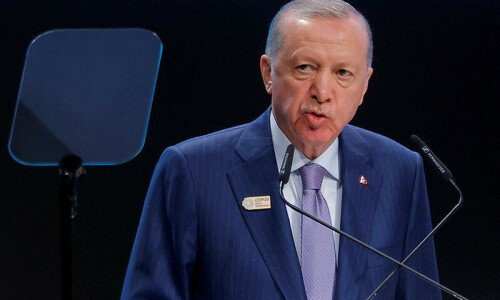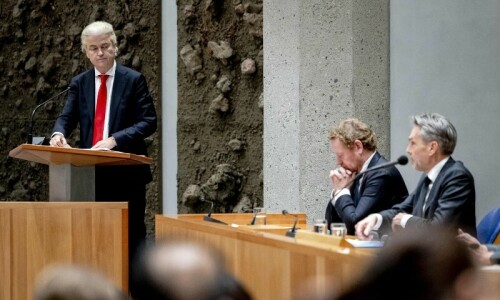WASHINGTON, Nov 28: US President Barack Obama has briefed Saudi Arabia’s King Abdullah on an interim agreement with Iran over its nuclear programme, the White House said.
“The President shared the details of the P5+1’s first step agreement with Iran regarding its nuclear programme, reaffirming the importance of Iran following through on its commitments,” said a statement issued by President Obama’s office.
According to the White House, the two leaders “agreed to consult regularly” on the P5+1’s efforts to negotiate a comprehensive solution that would resolve the international community’s concerns regarding Iran’s nuclear programme.
“President Obama reiterated the firm commitment of the United States to our friends and allies in the Gulf.”
Last weekend in Geneva, the five permanent members of the UN Security Council – the United States, Russia, China, Britain and France – and Germany concluded an interim agreement with Iran which seeks to cap Tehran’s nuclear capabilities. In return, the United States and its allies will relax some of their crippling economic sanctions on Iran.
The agreement, however, has annoyed America’s another key ally in the Middle East, Saudi Arabia, which fears that the deal will further strengthen Iran’s position in the region. The Saudis view a stronger Iran as an existential threat to them and their Arab allies in the Gulf.
The New York Times reported that before the deal was signed, “the Saudi king and his envoys — like the Israelis — … spent weeks lobbying fruitlessly against the interim nuclear accord.”
The Saudis “fear that any letup in the sanctions will come at the cost of a wider and more dangerous Iranian role in the Middle East,” the report said.
In a commentary on the Geneva agreement, Washington’s prestigious.
Brookings Institution noted that for the past 30 years, the United States had treated Saudi Arabia as its primary partner in the Persian Gulf.
While the two countries have cooperated on a number of issues, including preventing Soviet expansion and counterterrorism, the relationship at its core is based on a simple bargain: Saudi Arabia receives a US security guarantee in exchange for ensuring the stability of global oil prices, the report said.
The Brookings, however, noted that as the Middle East changed over the last decade, disagreements between the US and Saudi Arabia had grown both more public and frequent.
“Bitter rows over Egypt and President Barack Obama’s unwillingness to intervene in Syria have led senior Saudi officials to question US resolve and commitment to the region.”
The Geneva accord with Iran has further accentuated those differences.
“Whereas the United States views Iran’s return to the international fold as a potentially salutary development, Saudi Arabia regards this possibility as a crippling blow to the kingdom’s regional standing and an existential threat to the ruling al-Saud family,” the report added.
In an opinion piece published in its latest issue, the New Yorker magazine noted that the Saudis were not merely concerned about Iran’s nuclear ambitions. They have a more profound fear that geopolitical trends in the Middle East are aligning against them, threatening both their regional stature and their domestic security.
“The Saudi see an Iran that is dominant in Iraq and Lebanon, holding onto its ally in Syria, and now forging a new relationship with Washington—a rival, in short, without any obstacles to regional dominance, and one further emboldened to encourage (pro-Iranian) populations in the Gulf monarchies, including Saudi Arabia, to oppose their rulers,” the report added.











































Dear visitor, the comments section is undergoing an overhaul and will return soon.